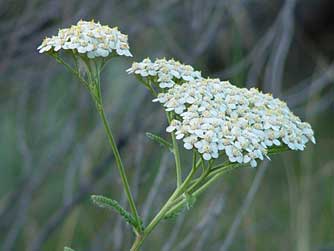
Yarrow is sometimes known as soldier's woundwort, milfoil and devil's nettle. Its botanical name is Achillea millefolium, so called because the Greek hero Achilles is supposed to have used it to treat the wounds of his warriors after battle.
In folklore, yarrow leaves were hung over the cradles of babies to keep away witches, and young women slept with it under their pillows so that they would dream of their future lovers.
It was used as an antiseptic in the treatment of wounds and to reduce inflammation and stop bleeding. Severe colds and fevers were treated with it since it induced perspiration. It was used in eruptive diseases such as measles and chickenpox to bring out the spots.
Yarrow was a popular aid to digestion, and kidney and liver disorders were also treated with it. High blood pressure was treated with it, and it was used to relieve varicose veins. It was used as a remedy for bleeding piles. As a diuretic it was used as a remedy for cystitis.
The herb was used as a tonic. If the head was washed with it, it was thought to improve baldness, stop hair from falling out and condition the hair. As a wash it was used to treat inflamed eyes.
Sponsored Links: